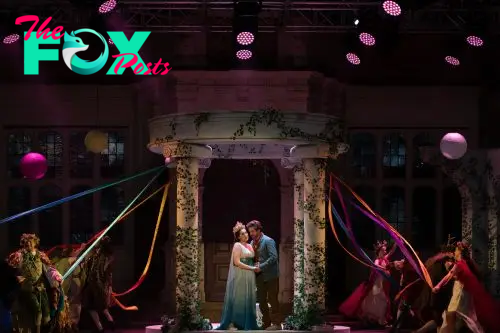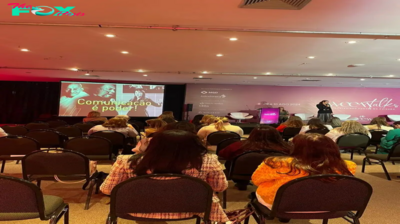Entertainment
Louise Bakker’s idea for OHP’s Acis and Galatea is bursting with extremely entertaining concepts – Seen and Heard Worldwide
 United Kingdom Handel, Acis and Galatea: Soloists, Ensemble of Opera Holland Park, Metropolis of London Sinfonia / Michael Papadopoulos (conductor). Opera Holland Park, London, 19.7.2024. (AK)
United Kingdom Handel, Acis and Galatea: Soloists, Ensemble of Opera Holland Park, Metropolis of London Sinfonia / Michael Papadopoulos (conductor). Opera Holland Park, London, 19.7.2024. (AK)

Manufacturing:
Director – Louise Bakker
Designer – Alyson Cummins
Lighting designer – Johanne Jensen
Chorographer – Merry Holden
Solid:
Antony Gregory – Acis
Elizabeth Karani – Galatea
Chuma Sijeqa – Polyphemus
Ruari Bowen – Damon
Handel composed a number of variations on the Acis and Galatea episode from E book XIII of Ovid’s Metamorphoses. First got here the 1708 Italian serenata Aci, Galatea, e Polifemo, then the 1718 two-act English model – variously described as a masque or a pastoral opera – which was written for a personal efficiency within the gardens of the Duke of Chandos’s palace.
For his or her first tour into Handel, Opera Holland Park has chosen Handel’s 1718 English model. OHP’s venue is right for this work: Handel composed it for the Chandos Backyard setting – phrases and music clearly consult with nature in abundance – and we have been surrounded by Holland Park’s pure magnificence, together with couple of birds flying out and in throughout this efficiency. In fact, neither Chandos Backyard nor Holland Park would host sea nymphs (like Galatea), sheep, or cyclops (like Polyphemus) however the magic of theatre can overcome realities.
Stage director Louise Bakker’s idea is bursting with extremely entertaining concepts. Nevertheless, for the purists (like myself) much less might need been extra.
The story tells the legend of sea nymph Galatea falling in love with shepherd Acis who – regardless of warnings to not become involved – responds with ardour. One-eyed cyclops Polyphemus additionally falls for Galatea and kills his rival Acis, however grieving Galatea turns Acis’s physique right into a stream.
There are 4 characters – Acis, Galatea, Polyphemus and Damon (who tries to smoothen bother) – and a refrain which arguably is supposed to supply commentary as Greek choruses do.
In Bakker’s course, an ensemble of eight singers is tasked to bop and mime all through. Through the orchestral introduction, they transfer across the stage continuously. They appear to be presenting a parody of what we’re listening to (absolutely not?) or, judging by their costumes, maybe of the Arcadian pretences of Chandos/Handel aristocrats. Or are they meant to be nymphs or spirits or the likes?
The perpetuum cellular idea is utilized to choral numbers too. As an illustration, the ensemble presents an eye-pleasing ribbon play whereas they’re singing their demanding polyphonic choral quantity (‘Oh, the pleasure of the plains!’).
I really like the concept of the ensemble shifting paper birds throughout Galatea’s aria ‘Hush, Ye fairly warbling choir’ however it’s barely overdone, because the music (that’s the recorder motives) make the chicken reference clear.
I’ve no downside with the ensemble dressed as sheep throughout Damon’s demanding aria (‘Shepherd, what artwork thou pursuing?’) however making loud sheep noises, questioning in and across the auditorium with a few of them happening all 4 is excessive (even whether it is entertaining). I admit to have been deeply embarrassed when one of many sheep lied on her again and made speedy actions with all 4 legs throughout Damon’s virtuoso vocal runs.
The ever-busy idea applies all through (though much less so within the second act then within the first). Generally I cherished it: the Acis/Galatea duet (‘Comfortable we’) features a beautiful garland and maypole dance (the latter probably borrowed from Ashton’s ballet La Fille mal gardée). Polyphemus’s stylised killing of Acis (with the entire ensemble actively taking part) can be an impressed thought. Nevertheless, I used to be relieved and grateful that no fussy ensemble interference was utilized to Acis’s transformation from a useless mortal to a stream: certainly, the staging was magical.

I just like the set design by Alyson Cummins which spreads throughout the entire stage. On the entrance it consists of what could also be signifying greenery; on the again there’s a round enclosure with columns, most likely hinting at historical Greece, and a swing. The costumes are eye-catching though at occasions, consistent with the staging, considerably complicated. Additionally, I’m not positive why Galatea, a sea-nymph, wears such a gorgeous regal costume.
A serious a part of the staging is the choreography. Merry Holden offers impressed, pleasing innovations and fulfils the directorial idea. It’s onerous to know what Handel, a sensible man of the theatre, would consider this manufacturing. Arguably, choreography does have a spot in opera however the steadiness between singing and dance deserves consideration.
The ensemble of eight singers is magnificent. They dance, mime and sing all through plus sort out some costume adjustments. The standard they current warrant full reward to all of them: Natasha Agarwal, Hugh Beckwith, Caroline Carragher, Eleri Gwilym, Dragoș Andrei Ionel, Christopher Killerby, Shakira Tsindos and Masimba Ushe.
The 4 solo singers additionally ship excellence, regardless of typically tough group distraction on stage. For Galatea I would favor a lighter soprano voice, for Polyphemus a deeper bass voice. Nevertheless, full reward to Antony Gregory (Acis), Elizabeth Karani (Galatea), Chuma Sijeqa (Polyphemus) and Ruari Bowen (Damon).
The sixteen-piece orchestra, specified because the Metropolis of London Sinfonia, included 4 baroque specialists who performed two baroque recorders, a theorbo and a harpsichord. Nevertheless, in flip, the twelve non-baroque Gamers adjusted effectively to the meant Handel-style. Martin Burgess’s violin solo in Galatea’s aria ‘As when the dove laments her love’ blended because it ought to, Owen Dennis supplied stunning oboe solos with elegant institutions (Damon aria: ‘Think about, fond shepherd’, Galatea aria: ‘Should I my Acis nonetheless bemoan’) and Rebecca Knight’s brief solo cello contributions have been discreet however supportive.
Conductor Michael Papadopoulos, most likely in command of all points of the musical efficiency, stunned me. Getting used to mediocracy in opera homes and live performance halls of every kind, I didn’t anticipate such astonishing accomplishment from a youngster nonetheless at the start of what hopefully can be a splendid service. Papadopoulos clearly is aware of Handel’s rating and is absolutely versed in baroque efficiency observe. Not often have I heard hemiolas (that’s baroque rhythms at musical closures) introduced with such readability but discretion and barely have I skilled what felt like applicable tempi all through the entire efficiency. Papadopoulos can be able to producing utmost magnificence with out sentimentality: Acis’s dying refrain (‘Mourn, all ye muses!’) was magical with its absolutely managed pianissimo passages.
Generally I’m requested whom do I regard amongst nice conductors of our present time. I often point out Semyon Bychkov, Vladimir Jurowski, Gustavo Dudamel, and so forth. Nevertheless, any further I’ll confidently add the title Michael Papadopoulos.
Agnes Kory
-

 Entertainment1h ago
Entertainment1h agoHighest-Paid Podcasters in the World: Joe Rogan, Bill Simmons and More
-

 Entertainment1h ago
Entertainment1h agoFrom Camila Cabello to Sabrina Carpenter, Look at Shawn Mendes’ Dating History
-

 Entertainment6h ago
Entertainment6h agoA Look at the Dating History and Rumoured Relationships of BIGBANG Star G-Dragon
-

 Entertainment13h ago
Entertainment13h agoMike and Lauren Sorrentino Introduce Baby No. 3 to Kids in ‘Jersey Shore’ Exclusive Clip
-

 Entertainment17h ago
Entertainment17h agoNatasha Rothwell on Her Memorable Firsts
-

 Entertainment22h ago
Entertainment22h agoFace Me and Other Korean Medical Crime Shows That are Must Watch
-

 Entertainment1d ago
Entertainment1d agoClassic Korean Movies Like Piagol to Add to Your Watch List
-

 Entertainment1d ago
Entertainment1d agoOver 60 Million People Tuned in to Watch Jake Paul vs. Mike Tyson



















